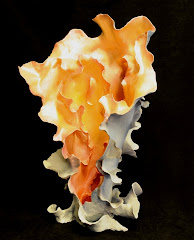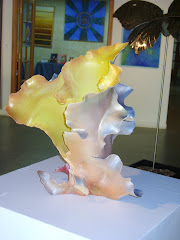Someone complained about the making of a rather wonderful animated video featuring a phantasmagorical musical instrument. They suggested that there are much better things to do, and he suggested a few. He apologized for having a "Scrooge" attitude, but insisted that there were more important things to do than making cartoons of imaginary music machines. Here's what I wrote back:
Nothing "Scrooge" about your stance, Lex. And as someone who is part of the EDC Senior Peer Counseling group, I completely agree with your alternative suggestion, or anything similar. There IS a lot of time spent on stupid, stupid things, some of them inadvertently or deliberately evil. And I don't often use that word.
Nevertheless, after reading such people as Buckminster Fuller, Robert Heinlein, Jane Jacobs and others, I have a somewhat different angle of view on such things. It has to do with the Nature of people as such, and what an actual civilization, which we DON'T have, (don't get me started....) might in fact be about. And a prime thing about those is related to "school.
"School" actually has to do with leisure: the leisure of anyone to take time to study the phenomenon of their own existence and the things presented to them as serving suggestions called "living." Generally that means, ideally, keen and free perception of data, both hard and soft, critical thinking, and creativity. Fact is, with what we have today, very few people would have to work in order to feed everyone and be in good relationship with each other and our battered Mother.
This flies in the face of our habituated consumer ethic which feeds the process of vacuuming wealth from what could be a citizenry, but in fact are cash cows. So in fact, if anything, I'm way more in favor of MORE of what that cartoon represents, AND more, way more, of the visiting, helping, etc. But neither of those is incompatible with good economics.
And part of that good economics, from my point of view, MUST be a far greater understanding and participation in real, live Music. Instead we are trained to have attention spans that can't easily go beyond a sound bite to the contemplation of a painting, a symphony, or a thought experiment. And yes, proficiency on an instrument is a hard earned reward, for the player and the audience both. (I know, as it is difficult enough to play a darbuka with any degree of proficiency,--I tired-- let alone a piano, horn , tablas. sitar, violin, bass, whatever!)
The pictured instrument reminds me of Rube Goldberg as well as your references. And we really don't know how it came to be. It is really slick, but may still be an exercise for producing other types of things. The Arts are a major part of California economy, and a major part of that are CG effects, from medical instruction videos to "I'll be back..."
The point I'm trying to make is that advancement for all of us comes primarily from "play" in its wide definition. That means from getting socialized in kindergarten on the playground, to playing in a drum circle or symphony, or staring at the fire mulling quantum equations, or a blank canvas or page--paper or electronic. In any case, it is play, not rote work that advances us.
When we look at such works as "Dark Age Coming" or "The Meaning of Human Existence," a very interesting picture of the absolute necessity of free time as the treasure trove of the possibility of survival and prosperity emerges. The drudgery of work, as we have come to accept it and bow to it, is a fiction invented for the benefit of a few. It could be all that and WAY more under different ways of organizing our efforts. And those efforts yield results when there is a large part of our population free to make cartoons of bouncing balls.
So, from here, I'm WAY more concerned about getting more people into a position to do that, and WAY fewer people making some rich by creating fake money and using it to wring blood from human turnips to keep them from thinking or feeling or volunteering to die in wars to protect oil barons and their kin. We tend to forget that if things were different, if there was complete equity (I'm not necessarily for that, btw) each man, woman and child would have 11 million dollars at birth to go on. That would make for some leisured schooling. Then perhaps the things that would have created an actual paradise on Earth would already be in place, instead of being suppressed to ensure slavery and control over the wasted potential of untold generations of astoundingly gifted, but grossly undeveloped humans thrown on the workheap of mental and economic slavery.
So I'm for the bounding balls, the visiting, the instrument playing and artwork, even if it is stick figures and sour notes, because that signifies, to me, exploration and discovery through development of technique and discipline. And from here, it would be great if people could do that without worrying about the temperature in their home, or what might be on their table or not, and if they can get to work to earn enough to be with their kids for more than a few minutes at bedtime. To me, the greatest triumph of Humanity would be to have playtime as a way of life. If it was, we might already be on a bigger and better Enterprise than anyone ever imagined.
Wednesday, October 15, 2014
Thursday, October 9, 2014
O Arjuna!
When spirit degenerates and avarice rages on earth
I reincarnate—
Erupting from the unmanifest,
Bright as a hundred thousand suns,
I come to destroy evil and to resurrect righteousness.
—Bhagavad Gita
SONG OF GOD REVISITED
Prince Arjuna’s eyes flicker wildly over the ranks of the enemy as his chariot blazes across Kurukshetra, resting for crucial seconds on the faces of gurus, relations and friends. As the unspeakable horror that is looming strikes him afresh, a tidal wave of doubt and fear paralyzes the ambidextrous master archer. Shaken, the star of the Pandavas manages to refocus his gaze upon the radiant figure engaged in skillfully steering his chariot through the seething battlefield: it is his comrade and kinsman,Krishna, also known as the Blue God, who has agreed to serve as his driver and counselor in this apocalyptic clash between the forces of good and evil.
Krishna is garbed in colorful attire that flashes like lightning on a stormy night. His skin is hued the dark turquoise of a newborn cloud. Sparkling diamonds adorn his person and a peacock feather waves gaily from his headband. And yet Arjuna is sharply aware that it is not Krishna’s physical glory, but his incandescent wisdom that alone can restore his world to righteous balance. “I beg your counsel, O Krishna!” the Prince cries in desperation. “Evil as my cousins are, I cannot battle my own kin! Is it not an ungodly act to fight those who once showered upon my family their great love?”
But Krishna only flashes Arjuna an inscrutable smile, and the Prince’s handsome head droops onto his chest in despair. “I’m no coward, O Krishna,” Arjuna mutters darkly. “I know the Kauravas are blinded by lust and jealousy...indeed treachery has become their second nature. Yet how can slaying them increase our happiness? Should I not offer myself to be killed, unarmed and unresisting?” And with an exclamation of disgust, Arjuna throws down his magical bow Gandiva and refuses to fight—a good thing, perhaps, since the intensity of his moral dilemma inspires Krishna to unravel the mysteries of the cosmos before him.
As limitless life-forms radiating streams of light separate and merge again to form the boundless being of the god of gods, the Prince hears Krishna’s resonant voice cutting through the din: “Certainly you mean well, O Arjuna!” Krishna says. “And yet your sorrow is sheer delusion: wise men do not grieve for the dead, nor for the living. Never was there a time when I did not exist, or you, or these kings—and nor will there come a time when we cease to be! These bodies come to an end, but that vast Self is ageless, fathomless, eternal!”
This cosmic vision blasts open Arjuna’s inner eye; suffused by grace, the Prince discerns the role of the gods in human life, the impeccability of karmic law, the immortality of the soul, and the way of the noble human. An enormous burden falls away from his hurting heart as he accepts that the spiritual duty or dharma of a spiritual warrior is to first determine what is right, and then to fight the encroaching darkness, disregarding consequences. And with a roar that resounds across Kurukshetra and straight up to the heavens, the shining star of the Pandavas reaches for his bow and recommits to leading his side into battle.
Ψ
Namasthe!
MiraWhat you can do, or dream you can, begin it --
Boldness has magic, power and genius in it.
Goethe
The desire for safety stands against every great and noble enterprise.
Tacitus
The desire for safety stands against every great and noble enterprise.
Tacitus
Subscribe to:
Posts (Atom)




















